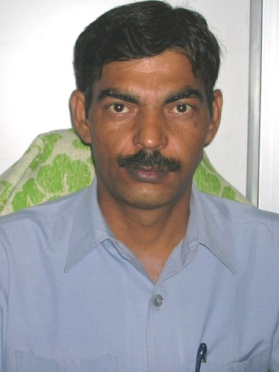Department of Entomology

Dr. M.S. Khan
| DESIGNATION: | Professor |
| QUALIFICATION: | Ph.D. |
| SPECIALISATION: | Insect pollinators, Pollination biology, Apiculture, Meliponiculture, Oilseed Entomology |
| EMAIL: | sarfrazms65[at]yahoo[dot]co[dot]in mohammadsarfrazkhan65[at]gmail[dot]com |
| CONTACT NO.: | +91-7500241513 |
Research Areas/Areas of interest
Research Projects
Selected Research Publications
- Deeksha, M.G.; Khan, M.S. & Kumaranag, K.M. 2021. Plant-pollinator interaction network among the scrubland weed flora from foothills of north-western Indian Himalaya. International Journal of Tropical Insect Science, 1-11.
- Yogi, M.K. and Khan, M.S. 2021. New record of a small carpenter bee, Ceratina compacta Smith (Hymenoptera: Apidae) from India. Journal of Apicultural Research, 60(5), 842-844.
- Kunjwal, N.; Khan, M. S.; Kumar, G. & Srivastava, P. 2020. Notes on the nesting ecology of the Megachile bees from North India. Journal of Apicultural Research, 60 (5), 807-816.
- Subbanna, ARN; Khan, M.S.; Stanley, J and Pattanayak, A. 2019. Bacillus licheniformis strain UKCH17 from northwestern Indian Himalayas: Characterization of chitinolytic enzyme and determination of its antifungal potential. Indian Journal of Experimental Biology 57 (07), 497-506.
- Kunjwal, N.; Khan, M. S. & Srivastava, P. 2019. Nesting biology of Megachile (Eutricharea) studiosa Bingham, a leafcutter bee. Journal of Apicultural Research, 60 (3), 491-502.
- Yogi, M.K., Khan, M.S. and Subbanna, ARNS. 2018. Molecular phylogeny of the large carpenter bee Xylocopa aestuans from North West India. Indian Journal of Entomology 80 (3), 1102-1108.
- Yogi, M.K. and Khan, M.S. 2014. Nesting biology of the small carpenter bees, Ceratina propinqua and Ceratina simillima (Hymenoptera: Apidae). Animal Biology, 64: 207-216.
- Goswami, Vimla and Khan, M.S. 2013. Management of varroa mite, Varroa destructor by essential oils and formic acid in Apis mellifera Linn. colonies. Journal of Natural Products, 6: 206-210.
- Khan, M.S.; Kumari, B.; Rohilla, H.R.; Kaushik, H.D. and Arora, R.K. 2004. Analysis of insecticide residues in honeys from apiary (Apis mellifera) and wild honeybee (Apis dorsata and Apis florea) colonies in India. Journal of Apicultural Research, 43(3): 79-82.
- Gupta, R.K.; Khan, M.S.; Bali, K.; Monobrullah, M. and Bhagat, R.M. 2004. Predatory bugs of Zygogramma bicolorata Pallister: An exotic beetle for biological suppression of Parthenium hysterophorus L. Current Science, 87(7): 1005-1010.
Book Chapters
- Kumar, G., Khan, M.S. (2023). Insects as Crop Pollinators. In: Omkar (eds) Insects as Service Providers. Springer, Singapore. https://doi.org/10.1007/978-981-19-3406-3_3
- Khan, M. S.; Srivastava, P. & Srivastava, R. M. 2019. Pollination. In: Strawberries: Production, Postharvest Management and Protection, 1: 321-333. Boca Raton: CRC Press.
- Subbanna, A. R. N. S.; Stanley, J.; Venkateshwaralu, V.; Chinna Babu, N. V. & Khan, M. S. 2019. Toxicological prospects on joint action of mocrobial insecticides and chemical pesticides. In: Microbes for Sustainable Insect pest Management, 1: 317-340. Springer Nature, Switzerland.
- Khan, M.S., Yogi, M.K. (2017). Insect Crop Pollinators. In: Omkar (eds) Industrial Entomology. Springer, Singapore. https://doi.org/10.1007/978-981-10-3304-9_14
- Gupta, R. K.; Khan, M. S.; Srivastava, R. M. & Goswami, V. 2014. History of beekeeping in developing world In: Beekeeping for poverty alleviation and livelihood security, 3-62. Springer, Dordrecht.
Research Articles
- Deeksha, M.G.; Khan, M.S.; Kumar, G. & Udikeri, A. 2023. Pollinator interaction with selected ‘weeds’ flora, Asteraceae, in the context of land use. Oriental Insects, 1-16.
- Kunjwal, N and Khan, M.S. 2023. Trap nesting bees of genus Megachile and nesting biology of three species of subgenus Callomegachile (Hymenoptera; Megachilidae) from North India. Animal Biology, 1-24.
- Deeksha, M.G.; Khan, M.S. & Kumaranag, K.M. 2022. Plant-pollinator interaction network among the scrubland weed flora from foothills of north-western Indian Himalaya. International Journal of Tropical Insect Science, 1-11.
- Yogi, M.K. and Khan, M.S. 2021. New record of a small carpenter bee, Ceratina compacta Smith (Hymenoptera: Apidae) from India. Journal of Apicultural Research, 60(5), 842-844.
- Kunjwal, N.; Khan, M. S.; Kumar, G. & Srivastava, P. 2021. Notes on the nesting ecology of the Megachile bees from North India. Journal of Apicultural Research, 60 (5), 807-816.
- Kunjwal, N.; Khan, M. S. & Srivastava, P. 2021. Nesting biology of Megachile (Eutricharea) studiosa Bingham, a leafcutter bee. Journal of Apicultural Research, 60 (3), 491-502.
- Subbanna, ARN; Khan, M.S.; Stanley, J and Pattanayak, A. 2019. Bacillus licheniformis strain UKCH17 from northwestern Indian Himalayas: Characterization of chitinolytic enzyme and determination of its antifungal potential. Indian Journal of Experimental Biology 57 (07), 497-506.
- Yogi, M.K., Khan, M.S. and Subbanna, ARNS. 2018. Molecular phylogeny of the large carpenter bee Xylocopa aestuans from North West India. Indian Journal of Entomology 80 (3), 1102-1108.
- Yogi, M.K. and Khan, M.S. 2014. Nesting biology of the small carpenter bees, Ceratina propinqua and Ceratina simillima (Hymenoptera: Apidae). Animal Biology, 64: 207-216.
- Khan, M.S.; Kumari, B.; Rohilla, H.R.; Kaushik, H.D. and Arora, R.K. 2004. Analysis of insecticide residues in honeys from apiary (Apis mellifera) and wild honeybee (Apis dorsata and Apis florea) colonies in India. Journal of Apicultural Research, 43(3): 79-82.
- Gupta, R.K.; Khan, M.S.; Bali, K.; Monobrullah, M. and Bhagat, R.M. 2004. Predatory bugs of Zygogramma bicolorata Pallister: An exotic beetle for biological suppression of ucts, 6: 206-210.
Students Guided